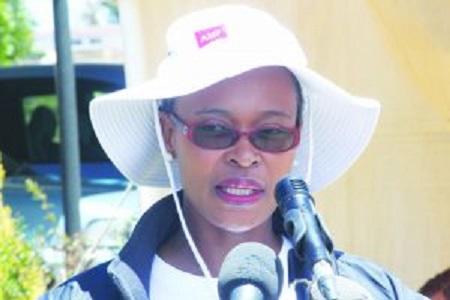Africa-Press – Lesotho. EVEN as a small 10-year-old girl, Puleng could notice that something had terribly gone wrong with her beloved mother. She noticed that her mother, ’Maitumeleng Paanye, would visit neighbours and steal anything she would lay her hands on.
She would also fabricate long tales and outright lies that triggered bitter quarrels among family members and neighbours. That was way back in 1995. But Puleng, young as she was, did not fully understand what was happening to her mother until one day when she did terrible things she says she is not comfortable discussing in 1997.
It was only then that she realised her mother was mentally ill. Puleng says the family found it extremely difficult to accept that their mother was suffering from a mental illness until she was admitted at Mohlomi Mental Hospital in Maseru.
She says it was painful to see her mother lose her job at a clothing factory because of her illness. Puleng tells thepost her mother’s illness began with her complaining of a mild headacmolotsi-monyamane111he which later intensified, hitting her hard around the neck area.
She would be on constant painkillers every day. The headache became worse as painkillers could not stop the pain anymore until she asked for advice from a friend who was a nurse at Queen Elizabeth II Hospital.
Paanye, who is now stable after treatment from Mohlomi Mental Hospital, tells thepost that her friend referred her to a doctor who prescribed even much stronger painkillers.
After a month of using the painkillers, her condition worsened, she says. She returned to the hospital and told the doctors that the headache had spread to the centre and was now worse than before.
“The doctor told me that if the pain had spread to the middle of the head then it needed to be attended to by a professional psychologist to figure out what was really depressing me,” she says.
Paanye says family fights and stress might have contributed to her illness. She says she was later admitted to Mohlomi Mental Hospital with severe depression and anxiety. Her daughter, Puleng, now a 32-year-old married woman, says her mother went through pain over the years.
“People who have mental problems need to be loved and cared for, they need to be given that freedom to express themselves when they need to and no one can better understand their attitudes and behavioural change than family members,” she says.
She adds that while she has grown up and is now married, she has never forgotten what her mother went through. She says her husband has also been very supportive helping her take care of her mother to ensure she takes her medication as prescribed by doctors.
“We know the signs of her meltdown and relapse. We know that when she starts visiting strangers and fabricating stories that cause people to fight we need to rush her to Mohlomi,” Puleng says.
She says sometimes her mother would go to the hospital voluntarily and they would be informed that she had been admitted. “She even knows her patient number by heart unlike us who need to check it in her file back home,” she says.
Paanye’s story vividly captures the plight of the mentally challenged in Lesotho. Paanye spoke on behalf of patients at Mohlomi Mental Hospital on Monday during the celebration of World Mental Day.
The day was held under the theme: ‘Dignity in mental health: Psychological first aid’. Paanye was among those who are lucky to have recovered from their illness and was part of the group that gathered at the celebration in Maseru.
Other mental patients, at various stages of recovery, also attended the event. She says good mental health is possible when a patient first accepts her condition and is faithful in taking her medication.
“You will not be well if you cheat or withdraw from you medication when you have mental problems. You need to be very faithful to them to have the best results,” Paanya says.
She says because of her faithfulness to medication she sometimes goes for three years without having to be readmitted to the hospital. “I used to come here every week but now they see me after a long time,” she says.
According to the World Health Organisation (WHO), the potential mental health and psychosocial consequences are well known as rates of mood and anxiety disorders, substance use, general psychological distress, social needs and impairments in social functioning increase among those exposed to crisis events.
’Mampho Malebo, a caretaker at Mohlomi, says they are doing all they can to help those affected by mental disorders.
“We show them that even though they are going through this mental challenge they are important, they are loved, they are beautiful. All of these positive attitudes we give to them helps them to become better in time,” Malebo says.
Malebo says mentally ill people need to be respected like everyone else, they need to have their human rights observed and respected accordingly. “They also need to be told of any matters that concern their families and be allowed to share their views and feelings,” she says.
’Mapaballo ’Mile, the National Director of Aids Health Care Foundation (AHF), says most of the people who have been admitted or diagnosed with mental disorders are those infected and affected by HIV/AIDS.
“People living with HIV/AIDS are at a greater risk of having mental disorders because some find it hard to accept their status when they discover that they are positive,” ’Mile says.
“They often wonder how they will break the news to their family members.
’Mile says they are well aware that HIV/AIDS patients often go through depression and anxiety and they need to be supported and loved if they are to survive their ordeal.
“(We must provide) dignity to the mentally challenged people. The church and schools need to hold hands to make this an opportunity for change.
Caring for a mentally challenged person is not easy, it needs concerted efforts,” ’Mile says. Health Minister ’Molotsi Monyamane, says mental disorders can affect anyone because tragedy can strike at any time to anyone.
“It does not discriminate against anyone, it does not look at status, wealth or gender or religion,” Monyamane says. Monyamane says one of the causes of high mental disorders is divorce.
“Divorce rates are very high these days and people have forgotten that it affects not only the divorcee and the divorced but the entire family members,” he says.
“All the family members need to have first aid care given to them.
” BOX
10 Things Only Kids Of Mentally Ill Parents Will Understand I never understood that I grew up with a mentally ill parent until a few years ago. I knew very well that my dad was prone to outbursts and extreme highs and lows.
As the oldest child in the divorce, I consciously remember taking on the brunt of his anger during his outbursts to shield my younger brother and sister from what was going on.
We all suspected that my dad was unstable at the time, but it wasn’t until recently that my sister found out he is now medicated. I don’t know all the details of his condition, but I can promise you that he did need help.
I really hope he has gotten help today. We are not close at the present moment because of everything I have just described, but we are working toward some sort of relationship. I think the worst thing about growing up with a parent with a mental illness is the unpredictability.
I don’t even know if my dad would remember the stories, or if he has blocked them out because they were so unpleasant, but I do remember him leaving me and my brother and sister several times when he was upset.
One time, he drove away and left us at a fast food restaurant with a group from church. I wasn’t old enough to drive yet, and I tried to put on a brave face, even though I was panicking inside.
I didn’t know if he was ever coming back or how we would get home. It was also before the age of cell phones, so I didn’t know who to call. He did come back about an hour later before anyone suspected that we were left there alone and acted like nothing had happened.
It’s tough to talk about these stories, but they need to be said. I came across an amazing anonymous post entitled, “What I want you to know about having a parent who is mentally ill.
” Based on the post and my own personal life, I’ve compiled a list of 10 things only kids of mentally ill parents can understand:
For More News And Analysis About Lesotho Follow Africa-Press






